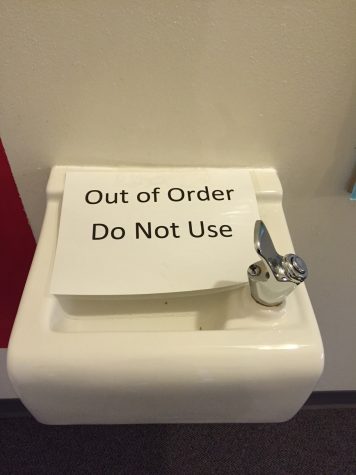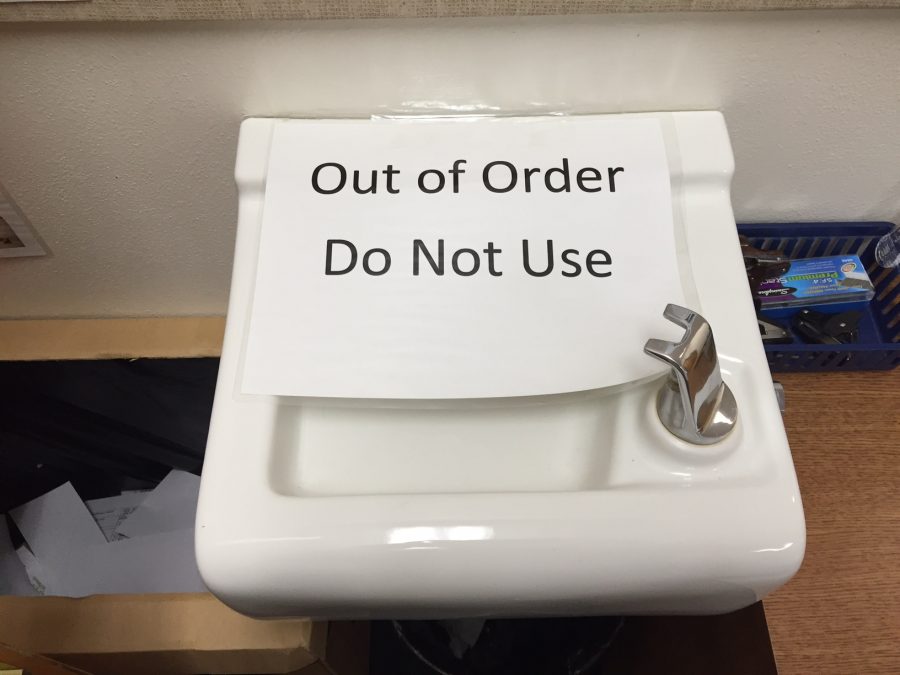Elevated levels of lead found in Dana, Potter halls
One of the four drinking fountains on the academic side of Potter hall that tested positive for elevated levels of lead in the water.
September 1, 2016
Higher than normal levels of lead were found in two of Linfield’s residential halls after the college voluntarily tested more than 200 drinking water sources on the McMinnville campus.
Two kitchen sinks in Dana Hall, a residential hall for students, had lead levels that were slightly over the federal standard. The faucets on the sinks were replaced, according to an email sent to Linfield community from director of Environmental Health and Safety, Rebecca Wale.
Potter Hall, which serves a residential hall and houses the education department, where classes are taught and a pre-kindergarten program is also located, had four drinking fountains on the academic side of the building that had elevated levels of lead.
The fountains have been turned off and bottled water is being provided until repairs and improvements can be made.
Wale is confident that students will not be exposed to anything harmful. “We expect to test around 300 areas in total,” Wale said.
While it is true that the lead levels in parts of Potter and Dana did exceed the Environmental Protection Agency’s allowed limit of 15 parts per billion, the lead level was still within the federally allowed limit of 20 parts per billion.
Wale writes in the email to the community that in 97 percent of the cases of water samples that were tested no elevated levels of lead were found.
Water samples were tested at Alexin Analytical Laboratories in Tigard, according to Wale.
She also mentioned that because the lab is in Portland it is currently being flooded with sample requests, as many Portland Public Schools have found higher than normal levels of lead in schools’ drinking water and tests are still on going.
As reported by Willamette Week, Portland State University also found elevated levels of lead in four of its residence halls.

A drinking fountain on the second floor of Potter hall that tested positive for elevated levels of lead in the water.
“We’ve replaced the older faucets and sinks that used lead soldering with newer ones,” explained Wale. While this works if the issue is old piping, Linfield relies upon the City of McMinnville for its water supply. “It could be that the reservoir has lead in it,” said Wale, but noted that she is confident that the issue is not with the water supply.
She explained that the City of McMinnville is required by state law to make public its test results for the city’s water, meaning that the college would know immediately if the water had higher levels of lead than the state and federal limit.
Since the cost of an individual lead testing kit can cost up to $200 per kit, it would be highly expensive for the college to do its own testing. By sending samples of the water to the lab in Tigard for testing, it costs around roughly $20 per sample, making it a cost-effective way for the college to ensure the entire campus is tested.
Wale also mentioned that while lead was used in previous decades for making sure pipes were malleable, many of Linfield’s building had been constructed before that time, and thus were able to be eliminated as a source of water contamination.
While most of the testing for lead has already been done, Wale said that health and safety will continue to keep an eye on the situation until they are convinced that there is no possibility of students drinking contaminated water. “We want to make sure that the students are safe and healthy,” Wale said.

